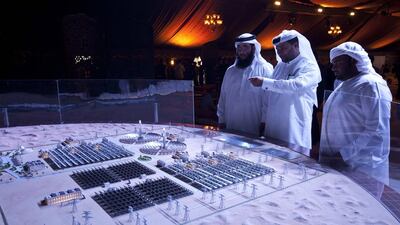The Gulf economies are only beginning to exploit the economic potential of other energy alternatives, such as renewable energy sources and nuclear power, despite considerable potential for resource-dependent technologies.
But this is set to change, as increasingly competitive economics of renewables in the region – solar photovoltaics in particular – are beginning to render renewables an economically attractive alternative to fossil fuels for incremental power capacity additions in the region.
The UAE’s new Energy Plan 2050 reflects the potential of alternative energy and a focus on greater energy efficiency. The plan aims to cut carbon dioxide emissions by 70 per cent, increase clean energy use by 50 per cent and improve energy efficiency by 40 per cent by the middle of the century, resulting in savings worth Dh700 billion.
Renewables make perfect sense in the Gulf, something the UAE has been at the forefront of demonstrating. Dubai has seen in 2015/2016 a series of low-price record rounds for the largest renewable energy demonstration project, Al Maktoum PV Solar Park. Recent cost bids in mid-2016 went as low as 2.99 US cents per kWh for an 800MW project, a world record low much below the cost of conventional fossil fuel-based plants in the emirate including coal.
While many of these initiatives remain in the demonstration phase, they provide the framework against which policymakers in the UAE and the wider Gulf region can position new energy technologies and as a key pillar of their own economic growth strategy. “Green” is now a factor generating growth, not hindering it.
And we’re in need of innovation. The UAE’s own domestic energy demand is growing rapidly along with the wider Gulf, tying valuable oil and gas resources to home consumption and away from higher-yield international export markets. The vast array of uses of renewable energy, on the other hand, is well suited to the highly urbanised centres of the Gulf.
Alternative energy also holds considerable potential for other sectors, for instance within transport. Hybrid and fully electric cars and public transport, such as metros and trams, offer the necessary technology options and expertise to reduce congestion, urban pollution and greenhouse gas emissions at the same time.
This also falls well in place with the UAE’s commitments made as part of the United Nations Paris Agreement of December 2015, which the UAE ratified in 2016.
Energy efficiency regulation will also need to form part of the drive to reduce waste, and to increase the UAE economy’s ability to achieve more with less. Building sector regulations such as Estidama’s Pearl Rating System already offer an initial framework, whose expansion could greatly benefit the quality of the building stock in Abu Dhabi and beyond.
At the same time, raising the minimum standards for electrical appliances, including air-conditioning systems, could benefit the energy economy further, as could, at the regional level, GCC-wide minimum standards – including outside the utility sector, for instance in the context of the UAE’s vehicle fleet.
Where some may see higher costs, others may see long-term savings and the gains of a cleaner, less wasteful economy that creates sustainable value for the long term. And it doesn’t stop there. Innovation and the need to reduce energy consumption within industry, business and the building sector can create high-value jobs and an industrial cluster along its value chain that fits in well with existing government targets to expand the region’s knowledge economy. These new industries help generate value in their own right, including by operating independent of the next oil price crash.
The International Renewable Energy Agency, headquartered in Abu Dhabi, estimates that achieving GCC renewable energy targets and plans in place in 2016 alone could create an average of 140,000 direct jobs every year across the region, implying that by 2030, close to 210,000 people could be employed in renewables. This is in addition to fuel savings made by harvesting solar power instead of using up valuable oil and natural gas resources in domestic transport and utility generation.
The UAE is now the Gulf’s leading renewable energy market, a position the country has potential to expand over the coming years and decades. Of course, this is not an easy game and requires consistent policy focus as well as, increasingly, a popular rethinking of how we use energy and water. But both economically and environmentally, it is a huge opportunity. This, coming from the heart of the Gulf Arab oil exporters, demonstrates how energy innovation and long-term economic growth indeed go hand in hand.
Laura El-Katiri is a consultant in Abu Dhabi specialising in economic, energy and environmental policy
On Twitter: @lauraelkatiri

